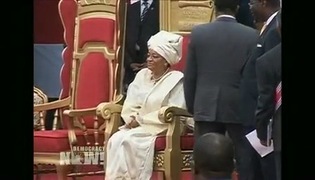
The 2011 Nobel Peace Prize has been awarded to a trio of recipients: Yemeni activist Tawakkul Karman, Liberian President Ellen Johnson Sirleaf, and Liberian peace activist Leymah Gbowee. The three women were cited “for their non-violent struggle for the safety of women and for women’s rights to full participation in peace-building work.” The trio of laureates follow only a dozen other women among 85 men to have won the prize over its 110-year history. We play an excerpt from this morning’s announcement by Nobel Prize Committee Chairperson Thorbjoern Jagland in Norway. [includes rush transcript]
Transcript
AMY GOODMAN: We begin today’s show with this morning’s announcement of the Nobel Peace Prize for 2011.
THORBJOERN JAGLAND: The Norwegian Nobel Committee has decided that the Nobel Peace Prize for 2011 is to be divided in three equal parts between Ellen Johnson Sirleaf, Leymah Gbowee and Tawakkul Karman, for their nonviolent struggle for the safety of women and for women’s rights to full participation in peace-building work. We cannot achieve democracy and lasting peace in the world unless women obtain the same opportunities as men to influence developments at all levels of society.
In October 2000, the U.N. Security Council adopted Resolution 1325. The resolution, for the first time, made violence against women in armed conflict an international security issue. It underlined the need for women to become participants on an equal footing with men in peace processes and in peace work, in general.
Ellen Johnson Sirleaf is Africa’s first democratically elected female president. Since her inauguration in 2006, she has contributed to securing peace in Liberia, to promoting economic and social development, and to strengthening the position of women.
Leymah Gbowee mobilized and organized women across ethnic and religious dividing lines to bring an end to the long war in Liberia and to ensure women’s participation in the elections. She has worked to enhance the influence of women in West Africa during and after war.
And in the most trying circumstances, both before and during the Arab Spring, Tawakkul Karman has played a leading part in the struggle for women’s rights and for democracy in Yemen.
It is the Norwegian Nobel Committee’s hope that the prize to Ellen Johnson Sirleaf, Leymah Gbowee and Tawakkul Karman will help to bring an end to the suppression of women that still occurs in many countries and to realize the great potential for democracy and peace that women can represent.
AMY GOODMAN: In an interview this morning, Yemeni activist Tawakkul Karman said her prize is a victory for Yemen and for all of the uprisings of the Arab Spring. Karman is a 32-year-old journalist and head of the Yemeni NGO Women Journalists Without Chains. She was detained for a time during the unrest.












Media Options